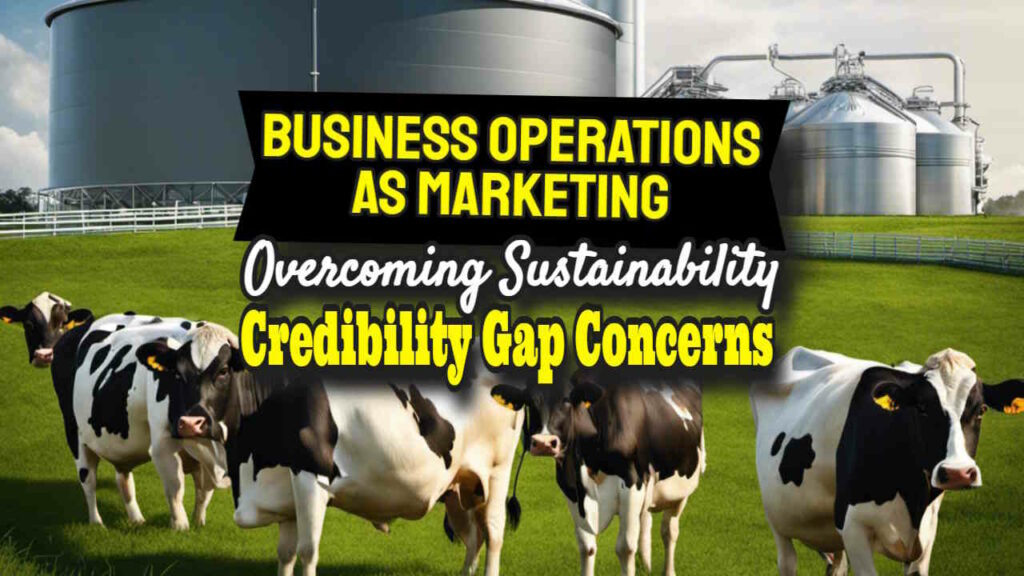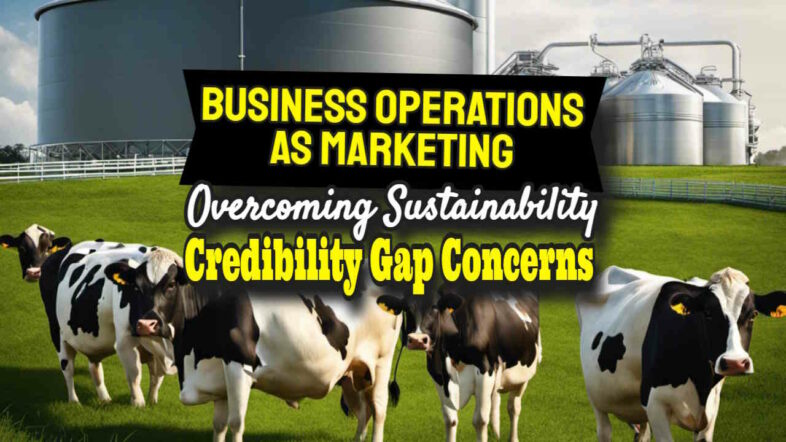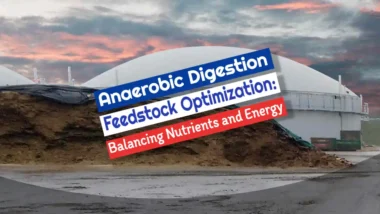In this article, we discuss the use of business operations as marketing. In the biogas industry, our business operations are green by nature, and yet many companies are still shy about using that fact to full effect in their marketing. This article is about AD plant owners getting past any perceived credibility gap worries to improve their marketing.
In short: Biogas business owners need to stop worrying about sustainability challenges from negative-thinking climate change doubters!
Still Not Clear What this is About? Read on!
In the realm of the anaerobic digestion industry, particularly those companies producing biogas sustainably, there exists a paradox in their approach to sustainability communication.
These companies, deeply entrenched in the nuances of their industry, are acutely aware of the criticisms they face. Common points of contention include:
- the use of fossil fuels to power machinery like tractors and
- the reliance on chemical fertilizers.
This heightened awareness often leads to a conservative portrayal of their sustainability efforts, stemming from a fear of being perceived as greenwashing.
This caution, while understandable, often does a disservice to these companies. In truth, many are making significant strides in promoting green energy and mitigating climate change, far more than they give themselves credit for.
The hard fact is that all biogas businesses have to operate in the real world or go bust.
They can only move to renewable options for their vehicle fuel and fertiliser needs when it is affordable. While the anaerobic digestion process is second to none in its ability to produce renewable fertiliser, very few farms can rely solely on their digestate as fertiliser and are forced to use non-sustainable options.
No Business is Perfectly Sustainable.
The biogas industry, despite its imperfections, plays a crucial role in developing sustainable energy solutions. By underplaying their achievements, these companies miss out on the opportunity to educate the public about the tangible benefits of their work and their genuine commitment to environmental stewardship.
It's essential, therefore, for these companies to strike a balance in their messaging.
Acknowledging the challenges and areas for improvement is important, but it's equally crucial to highlight their positive contributions. In an imperfect world, perfection isn't the benchmark; progress is.
By openly sharing their successes and ongoing efforts, the biogas industry can not only enhance its public image but also inspire and inform a broader audience about the importance and impact of sustainable energy solutions.
This transparency is what using your business operations as marketing is all about.
It fosters trust and demonstrates a deep commitment to the future of our planet, a narrative that is both honest and desperately needed in today's environmental discourse.

Business Operations as Marketing
It’s easy to think of different parts of your business as being entirely distinct from each other. Arguably, the two furthest ends of the spectrum in this regard could be your operations (the working patterns and the structure of how your service is created) and your marketing.
These two components might be more alike than you initially suspected, however, understanding that could lead you toward unifying them in a way that delivers effective results.
Peering behind the curtain of your business, after all, could be something that helps your audiences feel closer to you as a brand, especially if they don’t have any problems with what they see.
Ethics and Values
The power that your own business values have as a marketing tool isn’t an insignificant one.
Making it known to your audiences that you’re serious about combating climate change, for instance, can help to get people on your side, especially those who are looking for a sustainable way to live their lives. However, if this deep dive into your operations reveals that you’re not remotely sustainable and just as damaging to the environment as the worst offenders in business, it could cause a significant backlash.
It doesn’t have to directly contradict your values to be bad either; it could be a case of mistreatment or negligence toward another issue, such as labor, that leaves you looking less favorable in your audience’s eyes.

The Industry Standard
Perhaps this is an opportunity to show off why the results that you deliver are so effective—you can showcase the tools and technology that you arm yourself with to meet audience expectations. Sometimes, this is an approach that might require more subtlety than you expect.
Knowing your industry and your audience can be helpful when working out how to go about this.
For example, if you were in construction or demolition, drawing attention to your diamond industrial demolition concrete sawing can let those in the know understand that what you’re offering is top-of-the-line and something that’s able to deliver effective results.
Some may criticize the use of this technology for its energy intensity when in use and also for the additional carbon footprint involved in the production of industrial diamonds.
However, objections disappear when it is also explained that concrete sawing, when used in your business, is applied to minimize the demolition work done. This enables huge savings from the reuse of structures that would otherwise be completely demolished.
In this context, never be shy about marketing carbon-emissions-intensive parts of your business that, when used responsibly, become green assets capable of mitigating climate change.
Employee Happiness
While this could be considered to be an outcome of your ethics and values, it can be explored enough to be regarded as a stand-alone issue worth including in marketing materials.
In an age where achieving an optimal work-life balance is important to many people, being seen as a business that’s capable of delivering this might not only have audiences feeling more positively toward you, but it could also have more people wanting to work with you.
Again, this shouldn’t be something that’s easily contradicted by your actual practices or employee testimony—instead, prioritizing a healthy atmosphere and working culture where health is always considered might be able to speak for itself.
Business Operations as Marketing – Conclusion
In conclusion, the anaerobic digestion industry, particularly those companies producing biogas, must embrace a more balanced approach to communicating their sustainability efforts. A good way to do that is by using their business operations as marketing and simply telling people what you do!
While it's important to remain transparent about the challenges and areas needing improvement, these companies should also confidently highlight their positive contributions towards sustainable energy and climate change mitigation.
The anaerobic digestion industry offers rewarding jobs and admirable opportunities for a good work-life balance and happy staff. So don't forget to use that in your marketing materials either.
By doing so, biogas businesses not only reinforce their commitment to environmental stewardship but also educate and inspire a wider public.
This honest and proactive approach to sustainability communication is crucial not just for enhancing the image of the sector but also for playing a pivotal role in driving forward the global agenda for a greener, more sustainable future.






